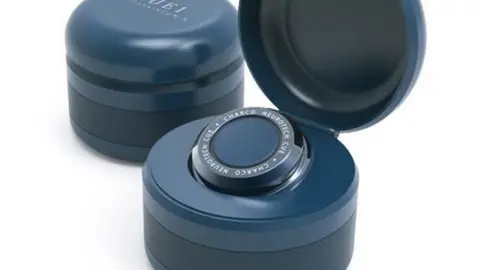Parkinson's disease device trial at Addenbrooke's Hospital
 Addenbrooke's Hospital
Addenbrooke's HospitalA device that could potentially improve the mobility of people with Parkinson's disease is being trialled on inpatients at a Cambridge hospital.
The CUE1, worn on the sternum of the chest, delivers vibration and pulses intended to improve motor skills and alleviate stiffness.
It is hoped the device, being trialled at Addenbrooke's Hospital, will also reduce falls.
Parkinson's disease can cause tremors, balance problems and slow movement.
Addenbrooke's Hospital has bought 10 devices with the help of its charitable trust.
They were developed by Cambridge company Charco Neurotech.
Lucy Jung, its chief executive officer, said: "The CUE1 has been developed by designers, engineers and clinicians, and offers a novel, non-invasive approach to minimising the symptoms of Parkinson's."
She said it was now "being trialled in a hospital setting for the very first time".
Dr Alistair Mackett, who specialises in Parkinson's disease at Cambridge University Hospitals Trust, said: "I felt that it was exciting to trial the CUE1 devices as they have been shown to be safe with almost no side-effects, yet potentially helpful with mobility and a reduction in falls.
"In the UK almost 1,000 people already use the device. We are the first hospital in the world to use them with inpatients.
"The pilot will allow us to collect data and understand how best to use the CUE1 device in people with Parkinson's who have been admitted to hospital."
 Addenbrooke's Hospital
Addenbrooke's HospitalHe said Addenbrooke's Hospital usually had between 20 and 30 inpatients with the disease at any one time.
"My hypothesis is that we might be able to see an improvement in mobility, allowing patients to better participate in therapy and hopefully go home quicker," he added.

Find BBC News: East of England on Facebook, Instagram and Twitter. If you have a story suggestion email [email protected]
